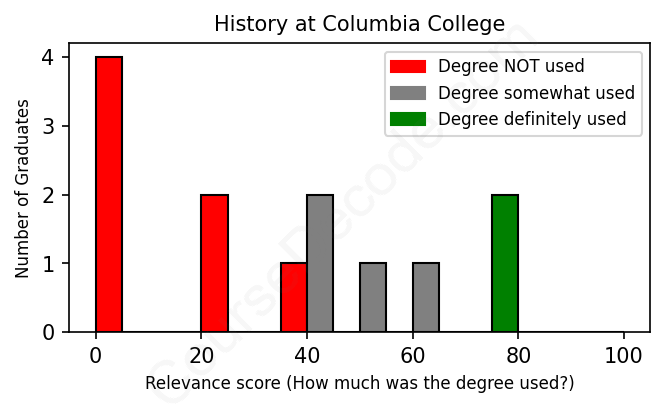
First, some facts. Of the History graduates from Columbia College we've analyzed , here's how many have used (or NOT used) their degree in their career:

These are estimates based on AI analysis of 13 LinkedIn profiles (see below).
The verdict? Horrible! Overall, with an average relevance score of 33%, History graduates from Columbia College have an exceptionally lower likelihood (-34%) of finding work in this field compared to the average graduate across all fields:
And for comparison, here's the chart for all profiles we've looked at across all degrees.
Also, after graduating, 53% of these graduates have pursued further education other than another Bachelor's degree (such as a Masters degree or other), compared to the average across all profiles of 35%. This suggests you may need more than just a Bachelors degree to be competitive as a History graduate.
See the details:
|
Relevance score: 77% We think this person has gone into a career highly relevant to their degree. We think this person has gone into a career highly relevant to their degree.
DEGREE INFOGraduated in 2015 from Columbia College with a Bachelor of Arts (B.A.) in History. No other secondary education since. JOB HISTORY SINCE GRADUATIONSenior Intelligence Analyst FSA Sep 2016 - Mar 2017 Supervisory Intelligence Analyst  FSA Mar 2017 - Jan 2021 Intelligence Analyst Advisor  General Dynamics Information Technology Jan 2021 - Jun 2021 Business Process Analyst Advisor  General Dynamics Information Technology Jun 2021 - Present ABOUTExperienced Intelligence Analyst with a demonstrated history of working in the government administration industry. Skilled in Leadership, Analytics, Project Management, Interpersonal Communication, and Microsoft Excel. Strong administrative professional with a Bachelor of Arts (B.A.) focused in History and Business Administration from Columbia College. |
The top 10 most common jobs done by the graduates we've analyzed (ranked most common to least) are:
Here is a visual representation of the most common words in job titles for History graduates (this is across all History graduates we've analyzed, not just those who went to Columbia College):

Looking at the career trajectories of graduates from Columbia College with a degree in History, it's evident that their paths have been quite varied. Many of these individuals seem to start out in roles that are somewhat detached from history itself, with early jobs ranging from administrative positions to roles in logistics and even military service. For instance, roles like Property Restoration Technician and Police Officer aren't directly linked to studying history. However, over time, some graduates have gradually shifted into positions that utilize their skills in a more relevant context, like becoming an Archives Technician or moving into roles with the U.S. Census Bureau, which could connect back to history through data collection and analysis.
Five to ten years out, it appears that a fair number of these graduates start finding their niche in more relevant fields. Some have transitioned into positions such as Chief Risk Management Officer or even Political roles, suggesting that a History degree can still be valuable in sectors like public administration, education, or healthcare management. However, it’s also clear that not everyone sticks closely to history-related fields. A significant portion seems to find stable careers in various administrative, logistical, or operational roles that might not leverage their historical knowledge directly but still provide a steady income. Overall, while some graduates go on to find good career trajectories related to history, many others end up in positions that don’t necessarily make full use of their degree, which is a common reality for a liberal arts education.
Getting a Bachelor’s degree in History, whether at Columbia College or anywhere else, tends to be a mix of interesting and challenging. It’s not generally considered the hardest degree out there, but it does require a lot of reading and writing, which can be daunting if you’re not a fan of that sort of thing. You’ll dive into various historical periods, analyze texts, and maybe even do some research projects, which can take time and effort. That said, if you love history and are curious about how it shapes the world today, it could feel more like a fun journey than hard work. Overall, it’s probably a bit easier than degrees in the sciences or engineering, but you still need to stay organized and engaged to keep up with the coursework.
Most commonly, in the LinkedIn profiles we've looked at, it takes people 3 years to finish a Bachelor degree in History.
Looking at the job paths of these Columbia College history grads, it seems like they've had a mixed bag when it comes to making decent money. Some have climbed the ranks in government and health sectors, like the Chief Risk Management Officer and the Navy leadership roles, which generally come with better pay and benefits. However, others have bounced around in lower-paying positions like lot attendants or administrative roles, which might not lead to a substantial paycheck. The latest grads are still starting out, so they'll need to build their careers a bit more before we can say they’re making bank. Overall, while a few seem to be doing well, others still appear to be juggling entry-level or less lucrative roles.
Here is a visual representation of the most common words seen in the "about" section of LinkedIn profiles who have a Bachelor degree in History (this is across all History graduates we've analyzed, not just those who went to Columbia College). This may or may not be useful:

Here are all colleges offering a Bachelor degree in History (ordered by the average relevance score of their History graduates, best to worst) where we have analyzed at least 10 of their graduates: